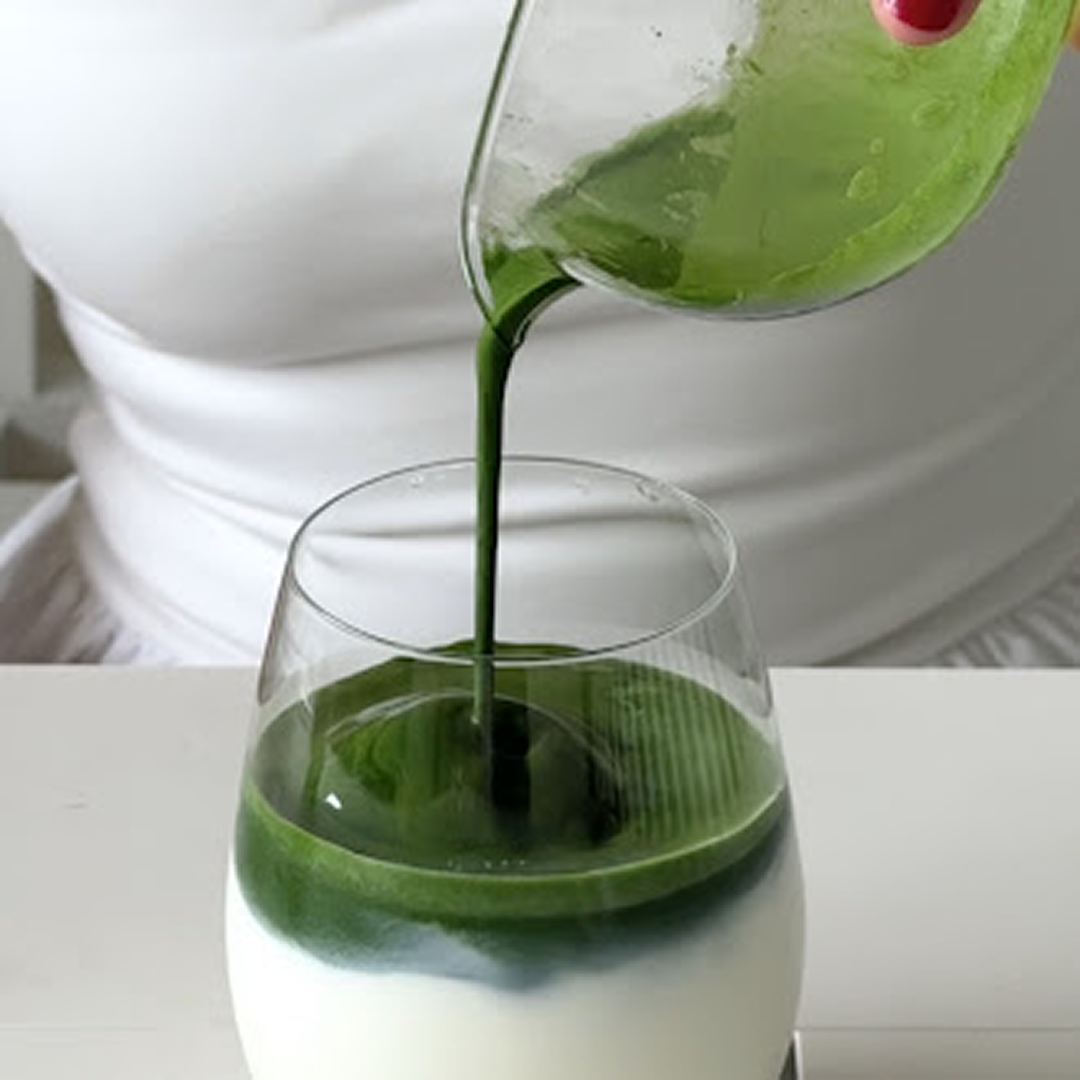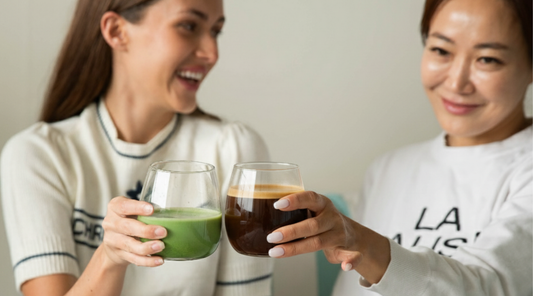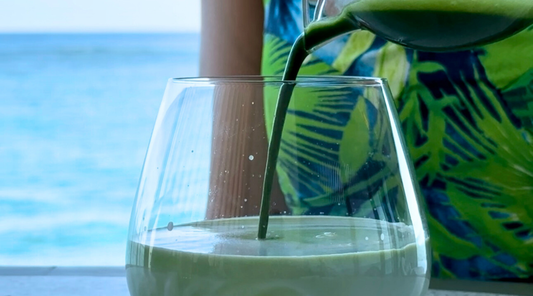
How Much Caffeine Is in Matcha Compared to Coffee?
Share
When picking a morning beverage to help you power through your day, matcha and coffee often top the list. Both contain caffeine, but the way they deliver energy and their overall effects can differ significantly. Whether you’re a die-hard coffee fan looking to switch things up, or a matcha lover curious about how your cup compares, understanding the caffeine content of these two traditional yet trending drinks is crucial.
Let's discuss how much caffeine is in matcha and coffee and how each impacts your body differently.
Caffeine Content: Matcha vs Coffee
Matcha
A typical serving of matcha, which is about 1 teaspoon (roughly 2 grams), contains 35-70 mg of caffeine. The exact amount can vary depending on factors like the quality of the matcha and how it’s prepared. Premium ceremonial or ceremonial-grade matcha, for instance, tends to have slightly more caffeine due to the younger, more nutrient-rich leaves used in production.
Read our very helpful article "The Ultimate Guide to Understanding Matcha Grades".
Coffee
A standard 240 mL cup of brewed coffee contains 95-200 mg of caffeine, depending on the type of coffee bean, brewing method, and serving size. Espresso, on the other hand, has about 63 mg of caffeine per 1-ounce or 30-mL shot, though many coffee drinks contain multiple shots.
In general, coffee has significantly more caffeine per serving than matcha, but the story doesn’t end there. The way your body processes the caffeine in matcha vs coffee is key to understanding why some people prefer one over the other.
How Caffeine Works in Matcha vs Coffee
Matcha: Sustained Energy Without Jitters
The caffeine in matcha is absorbed more slowly by the body compared to coffee. This is largely due to matcha’s high concentration of L-theanine, an amino acid that promotes relaxation without drowsiness. L-theanine works synergistically with caffeine, providing a calm, focused energy that can last for 4-6 hours without the jitters or crashes often associated with coffee.
Because matcha is consumed as a whole powdered leaf, rather than a steeped or brewed beverage, you’re also getting a higher dose of antioxidants like catechins, which help moderate the caffeine’s effects and provide additional health benefits.
Coffee: Fast, Intense Energy
Coffee’s caffeine hits the bloodstream faster, offering a quick burst of energy that many people rely on to jumpstart their day. However, this rapid caffeine absorption can also lead to a spike in energy followed by a crash a few hours later, especially if consumed on an empty stomach. The higher caffeine content can also lead to side effects like anxiety, restlessness, or an increased heart rate in some individuals.

Other Factors to Consider about Matcha vs Coffee Caffeine
Serving Size and Preparation
While the typical serving size for matcha is smaller than for coffee, many people enjoy larger or more concentrated servings of either beverage, which can increase the caffeine content. For example, matcha lattes often contain 2-3 teaspoons of matcha, bumping the caffeine content up to around 100-140 mg per drink – closer to that of a cup of coffee.
Similarly, brewing methods like cold brew coffee, which steep grounds for 12-24 hours, can lead to much higher caffeine concentrations than a regular drip-brewed coffee.
Health Benefits
Both matcha and coffee offer unique health benefits:
- Matcha is rich in antioxidants, particularly EGCG (epigallocatechin gallate), which has been linked to cancer prevention and heart health. It also supports calm focus, thanks to the combination of caffeine and L-theanine.
- Coffee is a well-known source of antioxidants and has been associated with benefits like improved mental function, lower risk of certain diseases like Parkinson’s, and boosted metabolic rate.
However, too much caffeine from either source can lead to issues like sleep disruption, anxiety, and digestive discomfort, so it’s important to consume in moderation.
Which Should You Choose?
Ultimately, the decision between matcha and coffee comes down to personal preference and how your body responds to caffeine.
If you want sustained, calm energy without the jitters, matcha might be your best bet. It’s also a great choice if you’re looking for a slower, more mindful caffeine experience that includes additional health benefits.
If you’re looking for a quick, intense energy boost to power through a busy morning, coffee is hard to beat – just be mindful of its potential for causing a crash later on.
How Much Caffeine Is Safe to Consume?
For most healthy adults, the FDA and other health organisations like the Mayo Clinic recommend limiting caffeine intake to about 400 mg per day. This is roughly the equivalent of four 240-mL cups of brewed coffee or eight servings of matcha.
Consuming more than this regularly can lead to side effects like insomnia, nervousness, restlessness, and even an increased heart rate or stomach discomfort. Some individuals may also be more sensitive to caffeine, meaning they can experience side effects with much lower doses.
For pregnant women, the safe limit drops to around 200 mg per day, as high caffeine intake has been linked to pregnancy complications.
When to Stop Drinking Matcha or Coffee to Avoid Sleep Problems
The half-life of caffeine (how long it takes for half of the caffeine to leave your system) is typically 5-6 hours. However, individual factors such as metabolism, age, and sensitivity to caffeine can extend or shorten this time.
To avoid sleep disturbances, experts generally recommend stopping caffeine consumption by early afternoon, around 2-3 PM. For those who are especially sensitive to caffeine or prone to sleep issues, it might be better to cut off caffeine intake even earlier, around noon.
Matcha’s combination of caffeine and L-theanine might provide a gentler energy boost, but its caffeine can still interfere with sleep if consumed too late in the day. Given matcha's slower release of energy, it's still important to stop drinking it several hours before you plan to sleep.
Caffeine is safe in moderation, but timing is crucial for ensuring it doesn’t interfere with your sleep. Coffee’s fast-acting caffeine can give you a jolt, but it’s best to limit intake to the morning. Matcha, with its smoother caffeine release, is better for sustained energy throughout the day, though it’s still best avoided in the late afternoon if you're sensitive to caffeine's effects on sleep.
Explore our extensive range of 100% organic, top-notch matcha to experience its unique blend of caffeine and health benefits.




